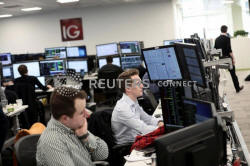Stocks rise, oil cools as anxiety over Mideast recedes
 Send a link to a friend
Send a link to a friend
 [January 07, 2020] By
Thyagaraju Adinarayan [January 07, 2020] By
Thyagaraju Adinarayan
LONDON (Reuters) - World shares steadied
and oil pulled back from multi-month highs on Tuesday after dramatic
post-new year moves, as investors judged that prospects of an all-out
conflict between the United States and Iran had eased.
After a strong rally, oil gave back some of its gains amid signs that
Iran would be unlikely to strike against the United States in a way that
would disrupt supplies.
Brent crude futures fell 44 cents to $68.48 a barrel, having been as
high as $70.74 on Monday, while U.S. crude dropped 34 cents to $62.93.
European equities meanwhile rose as much as 0.7%, tracking similar gains
in Asia. Technology stocks were among the top picks in Europe, mirroring
trends in the U.S. overnight.
MSCI's broadest index of Asia-Pacific shares outside Japan recouped
almost all of Monday's losses. Stock futures for the S&P 500 firmed
0.1%.
"Geopolitical risk has always felt much worse for markets in the heat of
the moment than it does in hindsight, but it's always possible that the
next one will bring us into a different era," Deutsche Bank strategist
Jim Reid said.
Risky assets started 2020 on the back foot as Tehran and Washington
traded threats after a U.S. air strike on Baghdad airport killed a top
Iranian commander.
On Monday the mood began to calm, helping U.S. shares recover ground.
The Dow ended 0.24% higher, the S&P 500 0.35% and the Nasdaq 0.56%.

Risk assets continued their rally even as Iran said it was considering
13 scenarios to avenge the killing of General Qassem Soleimani.
Marija Veitmane, a senior strategist at State Street, said she sticks to
her expectation of a slight improvement in economic and earnings
outlook.
"The world is well stocked with oil and can stomach short disruptions,
while large U.S. shale production should soften its impact," said
Veitmane, brushing aside worries that an oil price spike would dent
global growth.
(Graphics: Oil price spikes and Mideast tensions click,
https://fingfx.thomsonreuters.com/
gfx/buzzifr/15/4128/4128/Pasted%20Image.jpg)
[to top of second column] |

Traders look at financial information on computer screens on the IG
Index trading floor in London, Britain February 6, 2018.
REUTERS/Simon Dawson

SAFETY PLAYS OUT OF FAVOUR
On Tuesday emerging markets, which had been hit hardest by spiking oil prices,
bounced back, with stocks up 0.4%.
That left the MSCI world equity index, which tracks shares in 49 countries, just
0.5% from a record high.
"Markets got a lift from the lack of follow-through (after the air strike) as
yesterday progressed, and by the end of the session had actually staged a
reasonable recovery," Reid added.
Safety plays were out of favour, with gold retreating to $1,569.41 an ounce,
after scaling a near seven-year peak overnight. Euro zone government bond yields
edged up from around three-week lows.
The calmer mood also saw the yen lose much of its safe-haven gains, with the
dollar bouncing to 108.38 yen from a low of 107.75 hit on Monday.
Against a basket of currencies, the dollar drifted off to 96.752 but stayed well
above a recent six-month trough of 96.355.
The euro and sterling were trading slightly lower ahead of this week's vote in
Britain's parliament on Prime Minister Boris Johnson's European Union withdrawal
deal.
Bitcoin, the world's biggest cryptocurrency, broke above $8,000 overnight and is
up 13% since the U.S. drone attack in Iraq last week. Though it is not seen as a
safe-haven asset given its wild swings, the surge has coincided with the
equities sell off.
(Additional reporting by Wayne Cole; Editing by John Stonestreet and Catherine
Evans)
[© 2020 Thomson Reuters. All rights
reserved.] Copyright 2020 Reuters. All rights reserved. This material may not be published,
broadcast, rewritten or redistributed.
Thompson Reuters is solely responsible for this content.
 |